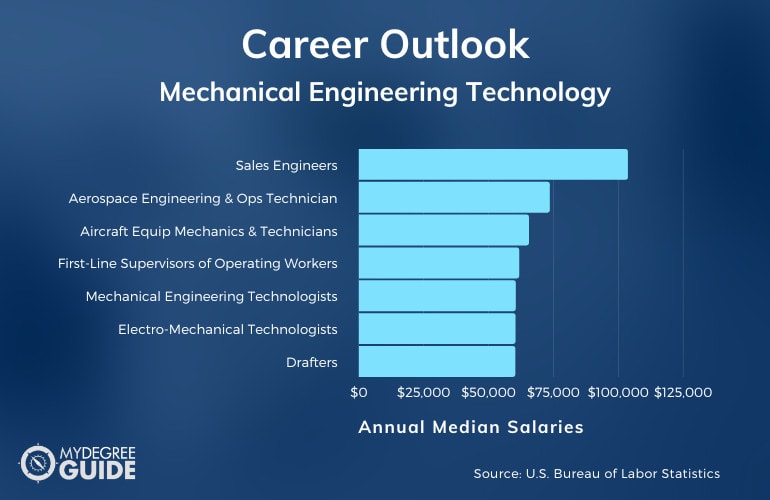If you’re looking to become a technician who specializes in tools, machines, and other equipment, then a mechanical engineering associates degree can help you get started.

Mechanical engineering technology is a major contributor to nearly all industries today, producing both essential everyday products and cutting-edge devices at the forefront of science. Getting an associate degree in mechanical engineering can give you a solid foundation in product design and manufacturing.
Editorial Listing ShortCode:
With roles such as engineering technician, design drafter, and technical sales specialist, many entry-level careers in this field have promising earning potential and stability.
Universities Offering Online Associates in Mechanical Engineering Degree Program
Methodology: The following school list is in alphabetical order. To be included, a college or university must be regionally accredited and offer degree programs online or in a hybrid format.
East Coast Polytechnic Institute University
East Coast Polytechnic Institute offers an Associate of Science in Mechanical Engineering Technology. Students that take classes year-round can potentially finish the program in 1.5 years. The full degree program is available both on campus and online. Coursework includes Introduction to Programming, DC and AC Circuits, Materials Science, and more.
ECPI University is accredited by the Southern Association of Colleges and Schools Commission on Colleges.
Indiana Tech
Indiana Tech offers an AS in Mechanical Engineering Technology. Traditional semester-long classes can be taken during the day on campus, or students may take classes that are 6 weeks long in the evening, on weekends, or online. Students in the program are provided with internship opportunities. Course options include Materials Science, Basic Machining, Manufacturing Processes, and more.
Indiana Tech is accredited by the Higher Learning Commission.
Lone Star College
Lone Star College offers an Associate of Science in Mechanical Engineering that can typically be earned in 2 years online or at any of the school’s six campus locations. All credits earned are designed to be easily transferred into bachelor’s degree programs at other Texas schools. Coursework includes Calculus I and II, Introduction to Engineering, General Chemistry for Engineering Majors, and more.
Lone Star College is accredited by the Southern Association of Colleges and Schools Commission on Colleges.
Midlands Technical College
Midlands Technical College offers an Associate in Mechanical Engineering Technology. Delivery options include on-campus, virtual, hybrid, and online. Accepted students can choose to study either full-time or part-time. Course options include Engineering Technology Foundations, Engineering Computer Applications, DC and AC Electricity, Dynamics and Kinematics, and more.
Midlands Technical College is accredited by the Southern Association of Colleges and Schools Commission on Colleges.
North Central State College
North Central State College offers an Associate of Applied Science in Mechanical Engineering Technology. The program is primarily intended to prepare students to work as mechanical engineering technicians, though graduates may also transfer into bachelor’s degree programs. The program requires the completion of 65 credit hours. Course options include Manufacturing Processes, DC Electricity, Engineering Materials, and more.
North Central State College is accredited by the Higher Learning Commission.
Northcentral Technical College
Northcentral Technical College offers an Associate in Mechanical Design Engineering Technology. The degree is available 100% online and at several different campuses. Coursework includes Technical Drafting and CAD, Technical Detailing, Materials of Industry, and more. Graduates of the program often become engineering technicians, design drafters, or CAD technicians.
NTC is accredited by the Higher Learning Commission.
Seminole State College of Florida
Seminole State College of Florida offers an Associate of Arts in Mechanical Engineering. Seminole State provides small class sizes and delivery options both online and on campus. To graduate, students in the program must complete 60 credits. Credits from this program are designed to transfer into bachelor’s degree programs at other Florida universities.
Seminole State College is accredited by the Southern Association of Colleges and Schools Commission on Colleges.
University of Massachusetts – Lowell
The University of Massachusetts—Lowell offers an Associate of Science in Mechanical Engineering Technology. The program consists of a mix of online and on-campus courses. Students can potentially finish the degree program in just 1 year. Course options include Engineering Design and Graphics, Statics, Electrical Basics and Laboratory, and more.
The University of Massachusetts Lowell is accredited by the New England Commission of Higher Education.
Online Mechanical Engineering Associates Degrees

A mechanical engineering associates degree is an undergraduate program that will train you in the fundamentals of designing, constructing, and testing physical products and machines.
Since it’s meant to prepare students for the workplace within 2 years of full-time study, it features plenty of specialized courses that are highly technical and hands-on. Mechanical engineering technicians are essential across several industries, including manufacturing, engineering, aeronautics, construction, mining, and medical technology.
Mechanical engineering technicians may take on the following tasks, often while supervised by engineers:
- Prepare engineering drawings using computer-aided design (CAD)
- Select, analyze, and assess the components and materials for manufacturing
- Assemble components into finished products while observing safety procedures
- Assess if products work properly and follow the original specifications
- Install, maintain, and troubleshoot problems with finished products
- Keep track of project deadlines and prepare update reports
- Conduct data analysis
- Maintain and calibrate equipment
Most of the basic skills required are covered in a mechanical engineering associate’s degree program. With this associate degree, you can learn about the different components of machines and how to put them together so they can work efficiently. This involves taking into account thermodynamics, kinematics, material strength, and manufacturing techniques.
You’ll also get to practice preparing engineering diagrams, creating technical reports and presentations, and systematically diagnosing malfunctions. Since mechanical engineering technology is interdisciplinary, you will also take introductory classes on electrical circuits and programming.
All in all, it’s an intensive degree that walks you through the entire product creation process. The coursework has a heavy amount of math and physics, but you’ll likely be working on a lot on practical projects too. Mechanical engineering technology has a wide scope. So, by the end of the degree program, you could be able to apply your skills to a variety of machines and products. Examples include:
- Aircraft engines
- Conveyor belt systems
- Pumps
- Refrigerators
- Transmissions
After you obtain your associate degree, you may choose to specialize in a particular field, such as aeronautics or ventilation systems. Many graduates eventually go on to earn a bachelor’s degree.
Mechanical Engineering Technology Careers & Salaries

An associate degree in mechanical engineering can help you develop the technical skills for helping design, develop, and test different types of machines and products.
Most graduates go on to become mechanical engineering technicians. Mechanical engineering technicians work under the supervision of mechanical engineers. Their tasks can include creating drawings using computer-aided software (CAD), inspecting and repairing machines, and building prototypes based on specifications.
Depending on your position and level of experience, mechanical engineering careers can have widely different salaries. According to the Bureau of Labor Statistics, here are the median salaries for some positions related to this field of study.
| Careers | Annual Median Salaries |
| Sales Engineers | $103,710 |
| Aerospace Engineering and Operations Technologists and Technicians | $73,580 |
| Aircraft and Avionics Equipment Mechanics and Technicians | $65,550 |
| First-Line Supervisors of Production and Operating Workers | $61,790 |
| Mechanical Engineering Technologists and Technicians | $60,460 |
| Electro-Mechanical and Mechatronics Technologists and Technicians | $60,360 |
| Drafters | $60,290 |
| Industrial Engineering Technologists and Technicians | $60,220 |
| Industrial Machinery Mechanics, Machinery Maintenance Workers, and Millwrights | $59,380 |
| Machinists | $47,730 |
Mechanical engineering technicians are found across various industries, including manufacturing, transportation, research and development, and materials production. Alternatively, you may pursue a more specialized role related to drafting and design.
For example, some graduates become CAD operators, drafters, tool designers, or product designers. These jobs utilize CAD software to create engineering diagrams and layouts. Some professionals even visit factories or manufacturing plants to check if their diagrams are being followed. There are also more people-oriented roles, such as sales engineer or laboratory technician in schools.
If you venture into sales, you could take technical products created by mechanical engineers and pitch them to potential clients. Laboratory technicians in academic settings will likely teach students how to use certain equipment as part of their job.
Mechanical Engineering Associate’s Curriculum & Courses

Most associate degrees in mechanical engineering are highly specialized, with the goal of getting you ready for the workforce quickly. Most mechanical engineering associate programs cover these types of courses:
- Manufacturing Processes: This course explores manufacturing techniques like 3D printing and injection molding, and it also covers how to estimate costs and manage manufacturing projects.
- Materials Science: You’ll study the properties and structure of various materials, such as ceramics and polymers, and you’ll also explore how processing techniques affect them.
- Strength of Materials: To design effective products, it’s necessary to know how materials react to stress and strain and how to do calculations to see if a given structure will work.
- Computer Applications in Engineering: You’ll delve into programming concepts that are relevant to engineering projects, including coding with low-level languages.
- Elements of Thermodynamics: This course looks at how energy changes in thermodynamic systems and states, with topics like phase transitions and energy conservation principles.
- Kinematics of Machines: You’ll get to know the basic principles that drive movement in machines so that you can learn to conduct mobility, velocity, force, and other types of analysis.
- Geometric Distancing and Tolerancing: Geometric distancing and tolerancing is a system that allows engineers and technicians to figure out how much variation in measurements machine components can have.
- Fluid Mechanics: Understanding how fluids act is important in mechanical engineering, so you’ll get to know concepts related to hydrostatics, flow in pipes, and dimensional analysis.
- Circuit Analysis: This course tackles both alternating current (AC) and direct current (DC) circuits, from the basic electrical theories behind them to design and troubleshooting.
- Technical Drafting: You’ll practice working with computer-aided software (CAD) to create 2D and 3D engineering diagrams.
On top of these, associate degrees in mechanical engineering feature courses in advanced math and physics.
Admissions Requirements

Here are some typical requirements for applying to a mechanical engineering associate program:
- High school diploma. Most schools will accept an official GED certificate as an alternative.
- Minimum GPA. Since mechanical engineering can be challenging to study, schools will likely check to see if you meet a minimum GPA requirement.
- Personal essay. Many programs want to know about your motivations for studying mechanical engineering and your career plans.
Associate programs often have more flexible requirements than bachelor’s programs, so it’s less likely that you’ll have to submit SAT or ACT scores. Some programs, though, may still require them.
Accreditation

It’s essential to get your 2 year mechanical engineering degree from an accredited school. Schools need to prove that they provide quality education before they can earn regional accreditation. For a list of accredited schools, you can check the US Department of Education’s online directory.
You can also look for associate programs that are accredited by the Accreditation Board for Engineering and Technology (ABET). By going to an accredited school, you’ll be able to apply for federal financial aid, and it could also be easier to get your credits approved for a bachelors program. Most employers prefer degrees from accredited schools as well.
Financial Aid and Scholarships

There are generally two kinds of financial aid for associate degree students: need-based aid and merit-based aid. Need-based financial aid is more common, and it typically comes in the form of student loans and grants. Loans have to be repaid with interest after you graduate, while grants are rarer because they’re gift money.
You can fill out the Free Application for Federal Student Aid (FAFSA) to apply for loans, grants, and work-study programs from the federal government. State aid might offer grants, while schools and other institutions may have loans at higher interest rates.
Merit-based financial aid usually comes in the form of scholarships. These can be very competitive and based on your achievements, extracurriculars, and GPA. There are also scholarships that are offered only to engineering students. If you’re already working in a related field while studying for your associate degree, your employer might have an education assistance program in place.
What Is Mechanical Engineering Technology?

Mechanical engineering technology is a broad field that focuses on designing and manufacturing products such as engines, machines, and robots. It’s very hands-on, with an emphasis on practical application over theory.
By studying mechanical engineering technology, you’ll learn about how engineering projects work, from crafting small components to setting up and maintaining finished products. This involves plenty of technical skills, including assessing how different materials react to stress and doing in-depth motion analysis for every product component.
Classes in this program are interdisciplinary, touching on thermodynamics, material science, electrical circuits, programming, and physics.
What Can You Do with an Associate Degree in Mechanical Engineering?
A mechanical engineering associate degree can help you qualify for entry-level technician roles in engineering and manufacturing. Because of the specialized training that it provides, graduates may be equipped to assist mechanical engineers with analyzing data, creating design drawings, assembling products, and conducting quality tests.
With these competencies, graduates can work in research facilities, automobile companies, and government agencies as well. Some even venture into non-technical fields, such as training and sales. In addition, it’s possible to get your associate degree credited toward a bachelors program.
How Long Does It Take to Get an Associate in Mechanical Engineering Online Degree?

An associate degree in mechanical engineering is a more short-term program compared to a bachelor’s degree, so you can usually finish it in 2 years if you study full-time. Most engineering associate programs have 60 credits at minimum.
For part-time students, an associate degree can take longer to finish, depending on the number of credits completed each semester. Associates in mechanical engineering degrees online tend to have more options for schedules, so you may also find programs with shorter, 8 week semesters. With these online mechanical engineering degree programs, you can typically finish faster by studying all year round.
What Jobs Can You Get with an Associates in Mechanical Engineering?
A mechanical engineer associates degree can help you qualify for several types of entry-level roles.
Some common positions in the field include:
- Mechanical engineering technologist. These professionals are supervised by mechanical engineers and can help out with design, production, manufacturing, and performance testing.
- Drafter. Drafters prepare technical drawings for manufacturing products using computer-aided design (CAD) software, including specific measurements and materials.
- Production supervisor. This role focuses on keeping production on track through project management and cost estimating.
Many graduates work in manufacturing, research, product design, drafting, quality control, sales, and plant management. Some also pursue work as sales engineers and research assistants.
What’s the Difference Between an Electrical vs. Mechanical Engineering Associate Degree?
Here are some of the major differences between electrical and mechanical engineering programs.
| Electrical Engineering | Mechanical Engineering |
|
|
Many products—such as sensors, robots, and medical devices—require both electrical and mechanical engineering.
Is a Mechanical Engineering Associates Degree Worth It?

Yes, a mechanical engineering associates degree is worth it for many professionals. Mechanical engineering technology is a highly technical field, and an associate’s degree can give you the formal training required to enter the field.
Mechanical engineering technologists and technicians are expected to see 6% job growth over the next ten years, with the possibility of 4,000 new jobs every year (Bureau of Labor Statistics). There are also many opportunities in the automotive and manufacturing sectors. Mechanical engineering technology offers plenty of options for career advancement, with the chance to pursue a specialization.
Getting Your Associate’s Degree in Mechanical Engineering Online

If you’re fascinated by how machines work and enjoy both analytical problem-solving and hands-on projects, then you might consider a mechanical engineering associate degree.
Nearly all of the products available today are made with mechanical engineering technology. There are also many industry niches that are expected to grow in the future, including aeronautics, automotives, and robotics. To get started with this field, you can look into getting your mechanical engineering technology degree online.
The sooner you start exploring associate degrees from accredited schools, the sooner you may find the program option that best aligns with your interests and goals.
